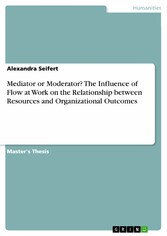Suchen und Finden
Mediator or Moderator? The Influence of Flow at Work on the Relationship between Resources and Organizational Outcomes
Mehr zum Inhalt

Mediator or Moderator? The Influence of Flow at Work on the Relationship between Resources and Organizational Outcomes
Master's Thesis from the year 2015 in the subject Psychology - Work, Business, Organisational and Economic Psychology, grade: 1,0, University of Vienna (Psychologie), language: English, abstract: Within the scope of positive psychology one main construct is optimal experience or flow. Flow is a state in which people are so involved in an activity that nothing else seems to matter. Although Maslow introduced the term `positive psychology` more than 70 years ago the research in this field is still sparse and conceptualizations as well as implications of flow are fragmentary and inconsistent. Therefore the present study among 117 white-collar employees investigates the relationships between flow at work, job resources (feedback, task variety, social support, autonomy and self-efficacy) and organizational outcomes (subjective well-being, work performance and health). In this concept it was assumed that resources and flow are predictors of organizational outcomes and that resources are also predictors of flow. Additionally, flow was studied as a mediator of the resources-outcomes relationship. Subjects completed online and paper-pencil-surveys including resources, flow and organizational outcomes. Analyses revealed that higher levels of job resources lead to higher levels of flow at work, as well as predicting well-being and work performance. In addition, employees who report frequent flow experience also report high levels of well-being and work performance. Furthermore, flow was found to be a mediator in the relationship of resources with subjective well-being and work performance. It is recommended that organizations should care more about resources and flow, since they predict well-being and work performance.
Alle Preise verstehen sich inklusive der gesetzlichen MwSt.







